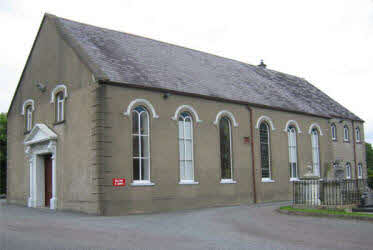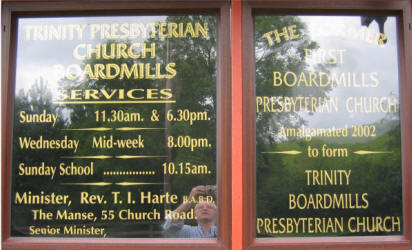
Boardmills - Trinity Presbyterian Church
Rev. Tom Harte Minister

Trinity Presbyterian Church, Boardmills.
Church Road, Boardmills.
Minister: Rev. Tom Harte
Telephone: 9263 8271
Sunday services: 11.30am and 6.30pm
Presbyterian Church in Ireland Website:

Notice Board at Trinity Presbyterian Church.
HISTORY
In January 2002, First Boardmills, Second Boardmills and Killaney amalgamated to form Trinity Presbyterian Church.
BOARDMILLS: First
Boardmills was originally a Secession congregation established circa 1749 when the Rev. Andrew Black, formerly minister of Cumbernauld, was installed on 22nd June 1749. He was present at the formation of the first Burgher Presbytery constituted in Ireland, and was one of its members. Mr. Black assisted in the establishment of Secession congregations at Ballynahinch, Loughaghery and Lissara. He died at Boardmills on 6th July 1782. He was succeeded by Mr. Joseph Longmore (lic. Monaghan) who was, according to W. T. Latimer, ordained in 1779. In 1802 the present Church was built, and a few months before his decease Mr. Longmore secured the Manse Farm for the future use of the congregation. He died on 10th October 1809, at a time when the distribution of the Regium Donum, according to a scheme of classification, caused great dissension among Seceders. On this matter the congregation at Boardmills was divided. Those who favoured their minister taking the revised grant wanted Mr. John Sturgeon, son of the Rev. John Sturgeon of Ballynahinch and Lissara, as minister, and a call to him was signed by 138 persons, with 91 members dissenting. Mr. Sturgeon was ordained on 31stJuly 1810.
The name of the congregation until 1815 was Killaney, occasionally Boardmills, but the latter name was then established, probably owing to its registration as the name of the congregation in receipt of a government grant. Mr. Sturgeon died on 22nd December 1840. During his ministry the party opposed to the Regium Donum seceded and formed the congregation of Second Boardmills. He was succeeded by Mr. George Hay Shanks (lic. Down 1839) who was ordained on 13th October 1840. He was a great friend of the 1859 Revival and much used at that time. He retired in 1889 and died on 18th December 1893. An advocate of the Temperance cause, it was largely owing to Mr. Shanks that the congregation was one of the earliest to use unfermented wine at Communion.
He was succeeded by Mr. John Lindsay McCandless (lic. Letterkenny 1889) who was ordained on 30th October 1889. In 1926 the congregation received the gift of a spacious hall from Mr. John McKee, New York, a former member. Like his predecessor, Mr. McCandless was an ardent Temperance advocate, and from 1909-14 he was head of the Good Templar Order in Ireland. He died on 24th June 1933. He was succeeded by Mr. Walter Kerr (lic. Letterkenny 1932) who was ordained on 29th November 1933. In 1937 two rooms were added to the Church building for minister and choir. A faithful pastor and a valued Presbytery Clerk, Mr. Kerr had a long ministry here. During that time a new pulpit and stained glass windows were put in the Church; a new reading desk, choir seats and baptismal font were also installed. The McKee Hall was destroyed by fire and rebuilt in 1951. Mr. Kerr retired on 30th November 1973.
The average length of active service of these six ministers of this congregation has been 37 years, a truly remarkable and unusual feature. After Mr. Kerr’s retirement and the translation of the Rev. William Trevor Coburn, minister of Second Boardmills and Killaney, to Cookstown (Molesworth Street) these two congregations were united with First Boardmills under Rev. George Simpson.
BOARDMILLS: Second
When the minister of Boardmills, the Rev. John Sturgeon, signified his intention of accepting the classified Regium Donum those members of the congregation who were opposed to this action formed a congregation and sent a petition to the Glasgow Presbytery of the Original Secession (Old Light Burgher) Synod on 3rd November 1811, asking for “supply of sermon”. The petition was granted and ministers were sent over periodically. After some years a call was made out to Mr. John Shaw, a member of the congregation, and he was ordained on 18th March 1816. A church building had been erected in 1812, with the inscription above the entrance “For Christ’s Free Men”. Mr. Shaw died of a fever on 23rd May 1825, aged 37 years. He was succeeded by Mr. John Downes, a native of Falkirk. Mr. Downes had several calls at the same time and the Synod decided that he should accept the call to Boardmills. This he did on 10th May 1826. On 7th July 1851 Mr. Downes and the congregation applied to the Belfast Presbytery to be received by the General Assembly. A year later the General Assembly sanctioned their admission. Four years later Mr. Downes received a call to Hobart, Tasmania, and resigned the congregation on 7th August 1855. He was succeeded by Mr. Alexander Dobbin (lic. Belfast) who was ordained on 27th December 1855. During his long ministry a manse was built in 1892, and the Church renovated in 1880 and in 1901. He retired from active duties of the ministry in September 1903 and died on 8th September 1909. “He never seemed to grow old. He was always mighty in the Scriptures”. He was succeeded by his son, Mr. John Wilson Dobbin, who was ordained on 26th November 1903. He resigned on 14th February 1907 to accept a call from Houghton-le-Spring, Co. Durham.
Another long ministry began when Mr. Robert Kelso (lic. Letterkenny) was ordained on 31stOctober 1907. He served as an Army Chaplain in World War I from 1916-1919, during which time the congregation was looked after by Rev. R. W. Dodds of the Kinghan Mission and Rev. Dr. R. H. Beattie, a retired Army Chaplain. In 1924 a deputation from Killaney Secession Church asked him to become minister of a proposed united charge of Killaney and his own Church. He agreed and in June 1925 the Rev. John Moody, minister of Killaney and his congregation were received into the General Assembly. Mr. Moody resigned on 30th July 1925 and Mr. Kelso was installed as his successor. Mr. Moody died on 3rd December 1926.
BOARDMILLS: Second and KILLANEY
The Rev. Robert Kelso, by being installed in Killaney, became the first minister of this new union of Killaney and Second Boardmills, which was instituted on 30th July 1925. He died on 16th June 1950. He was followed by Mr. Frederick Allen Pickering (lic. Belfast) who was ordained on 21stFebruary 1951. His was a brief ministry during which many alterations and repairs were carried out to the Church property. He resigned on 18th May 1957 and was called to Conn and Mount Forrest congregations of the Sangeen Presbytery, Canada, on 1stOctober 1957.
The next call was to Mr. Arthur Harold Graham (lic. Ballymena) and he was ordained on 17th October 1957. From the first Mr. Graham developed his gifts as an evangelist and held special services for his brethren in many places. The Church was extensively renovated at this time and new windows were installed in the entire building. He was called to Gt. Victoria St., Belfast, on 5th February 1964, and was followed by Rev. William Trevor Coburn (lic. Belfast 1961) who had been ordained assistant in Whitehouse on 23rd May 1962. He was installed here on 2nd September 1964. He too effected property changes, having a new minister's room and choir room added. After ten years on 20th March 1974 he accepted a call from Molesworth congregation, Cookstown, and the vacancy that followed led to the happy re-union of three congregations, First Boardmills, Killaney and Second Boardmills.
BOARDMILLS: First and Second and KILLANEY
These congregations came together on 1stMay 1974 and the first minister called was Rev. George David Simpson (lic. North Belfast 1973) who had been ordained assistant minister of Joymount, Carrickfergus, on 30th December 1973. He was installed here on 27th February 1975. He resigned when called to Dunlop Memorial Belfast on 31st Jan. 1978 and was followed by Rev. William Caughey of Ramoan who was installed on 1stSeptember 1978 and resigned in August 1984 when called to Carrigart, Co. Donegal.
BOARDMILLS: Trinity Presbyterian Church
Mr. Caughy’s successor, the Rev. Kenneth McConnell, formerly minister of Second Comber Presbyterian Church was installed as minister of First Boardmills, Second Boardmills and Killaney on 19th April 1991 and resigned in October 2000 when called to Oldpark Presbyterian Church, Belfast. The Rev. Drew Abernethy, was appointed Convenor of the Vacancy and in January 2002 the congregations of First Boardmills, Second Boardmills and Killaney amalgamated to form Trinity Presbyterian Church, Boardmills and now meet for worship in the church formerly known as First Boardmills. Both Second Boardmills Church and Killaney Church are now closed.
The present minister, the Rev. Tom Harte, previously in Crumlin Road Presbyterian Church, Belfast was installed on 22nd March 2002 as minister of the amalgamated congregations now known as Trinity Presbyterian Church.
A history of First and Second Boardmills and Killaney
Presbyterian Churches is shown on this web site:
Click on:
"The Church in the Rolling Hills" Two Hundred and
Fifty Years 1748-1998.
A history of Second Boardmills Church by Aiken McClelland (1963)
is shown on this web site:
Click on:
Second Boardmills Presbyterian Church 1813 - 1963
Brief history as recorded in a book ‘Lisburn’s Rich Church Heritage’ by John Kelly
For many years, there were three Presbyterian congregations, within close proximity, in Boardmills. First Boardmills was established by the Seceders in 1749 when the Rev Andrew Black was installed. The Seceders had broken away from the Church of Scotland and although the reasons for the breakaway did not apply in Ireland, many Irish Presbyterians, dissatisfied with their own ministers, applied to the Seceders for supply of preaching. First Boardmills Church was built in 1802, and in 1926 the congregation received the gift of a spacious hall from Mr John McKee, New York, a former member. Two rooms were added to the church in 1937 during the ministry of the Rev Walter Kerr (1933-1973) and also during that time a new pulpit, stained glass windows, reading desk, choir seats and baptismal font were installed. The McKee Hall was destroyed by fire and rebuilt in 1951.
In 1811 when the minister, the Rev John Sturgeon, announced his intention of accepting the Regium Donum (a government grant to Presbyterian ministers), some members of the congregation opposed this and left the congregation to form Second Boardmills. The congregation joined the General Assembly in 1851. Meanwhile, when First Boardmills joined the General Assembly in 1840, some members objected; there was a fierce dispute over ownership of the meeting house before the objectors built their own church in 1846, calling it Killaney.
Second Boardmills and Killaney were united in 1925 under the ministry of the Rev Robert Kelso and the three congregations came together under the ministry of the Rev George Simpson in 1974. In January 2002, they were amalgamated into a single congregation - Trinity Presbyterian Church, and the present minister, the Rev Tom Harte, was installed here in March 2002.
